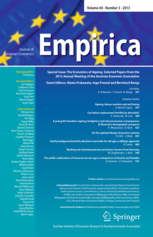Trade liberalization gains under different trade theories: a case study for Ukraine
Olekseyuk, Zoryana / Edward J. Balistreri
External Publications
(2017)
published on Empirica 26 April 2017, 1–36
DOI: https://doi.org/10.1007/s10663-017-9371-9
Volltext/Document
We analyze the deep and comprehensive free trade area (DCFTA) between Ukraine and the EU using a multi-regional general-equilibrium simulation model. Three alternative trade structures are implemented: (a) a standard specification of perfect competition based on the Armington assumption of regionally differentiated goods; (b) monopolistic competition among symmetric manufacturing firms; and (c) a competitive selection model of heterogeneous manufacturing firms. Across these structures the DCFTA indicates relatively large gains for Ukraine of more than 3 percent. We show, however, that the gains for Ukraine are lower when we consider monopolistic competition in manufacturing. This is attributed to a movement of resources into Ukraine’s traditional export sectors to the EU, which produce under constant returns. While there is little danger of deindustrialization dominating the overall welfare gains, we do observe substantially lower gains when we consider monopolistic competition. To our knowledge, this is the first empirical confirmation of the theoretic predication that the relative gains from trade in monopolistic competition models might be lower than under perfect competition in the context of a numeric simulation of economic integration. Under the popular heterogeneous-firms monopolistic competition theory we find significant firm selection effects indicating welfare impacts for Ukraine that are less than under the Armington structure but above those found under symmetric firms and monopolistic competition. These results are important considerations for Ukraine’s overall development strategy.


